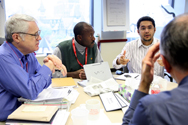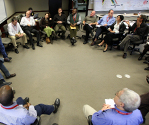Applications for Class 12 are closed.
We will announce the dates for Class 13 shortly.
The International Masters for Health Leadership is a graduate program for professionals currently working in the health sector.
Please don’t submit your CV unless you are working in health care.
The International Masters for Health Leadership (IMHL) consists of five 11-day modules, followed by a master's paper, leading to the degree of Master of Management.
Each module focuses on a particular managerial mindset. Between modules students return to the workplace where they apply the learning and insights of the program. We encourage our students to focus on the organizational and system-wide changes they want to create. Students can come to class ready to address specific challenges they encounter in their unique environments, allowing for real-time applications. Following the five modules, there is a period in which the final master's degree paper is written with the guidance of an advisor. This last phase can be done from anywhere in the world.
Module 1 - The Reflective Mindset: Broadening Perspectives
The Reflective Mindset is designed to help students gain a better understanding of their personal management style - how they present themselves to others, their strengths and weaknesses, and their current leadership and management skills. Students learn how to be thoughtful and reflective, to step back from always doing, and to see familiar experiences from a new perspective.
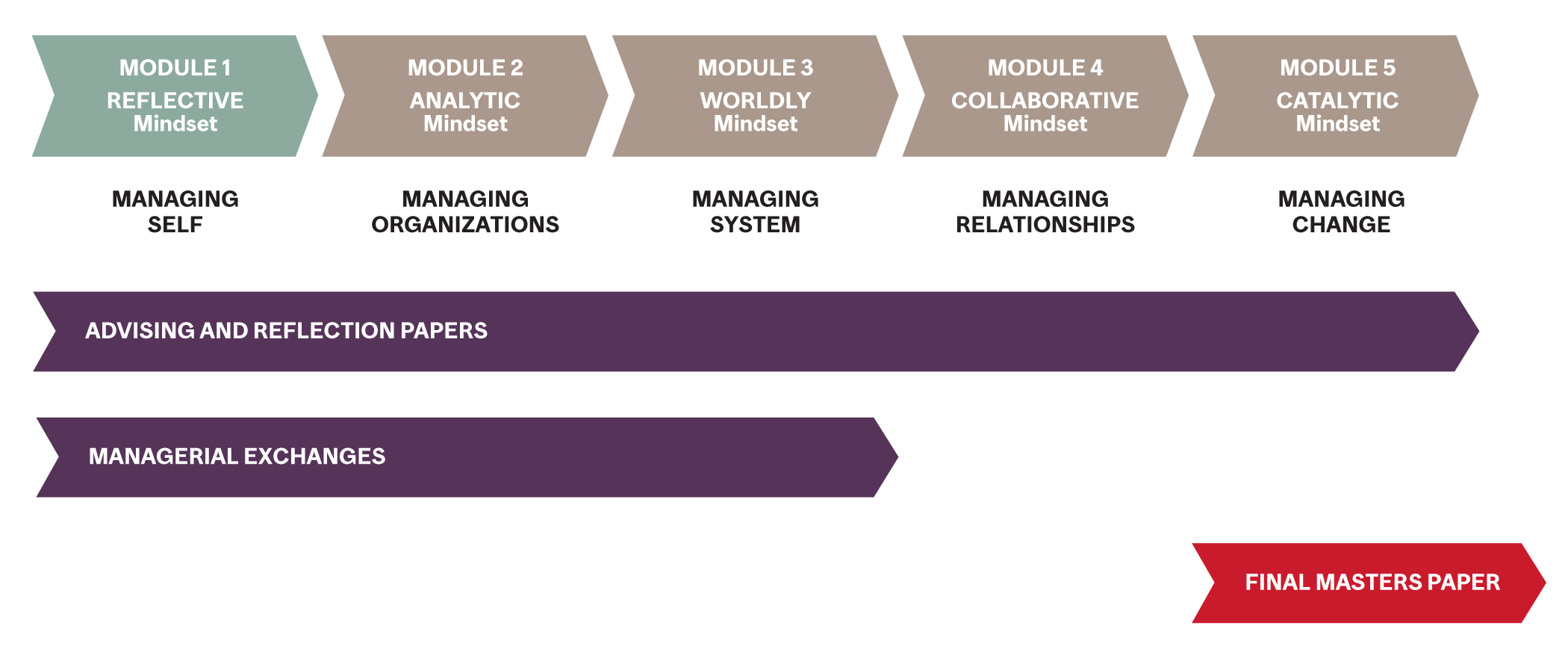
Module 2 - The Analytic Mindset: Leading and Managing Organizations
The Analytic Mindset provides an overview of today's principal health care organizations including health promoting hospitals, community agencies, health maintenance organizations, etc. Students gain insight into the operation of these organizations by analyzing their intrinsic similarities and differences. Students are also introduced to the analytical tools, both quantitative and non-quantitative, used to manage organizations, as well as to formal approaches that improve managerial decision-making. Key concepts in financial management, people management, organizational strategy and operations management stimulate students to diagnose the strengths and weaknesses of their own organization. Strategy, structure, sourcing and delivery are explored in a systematic way to allow students to view the managing process as an ongoing work of art, craft and science.
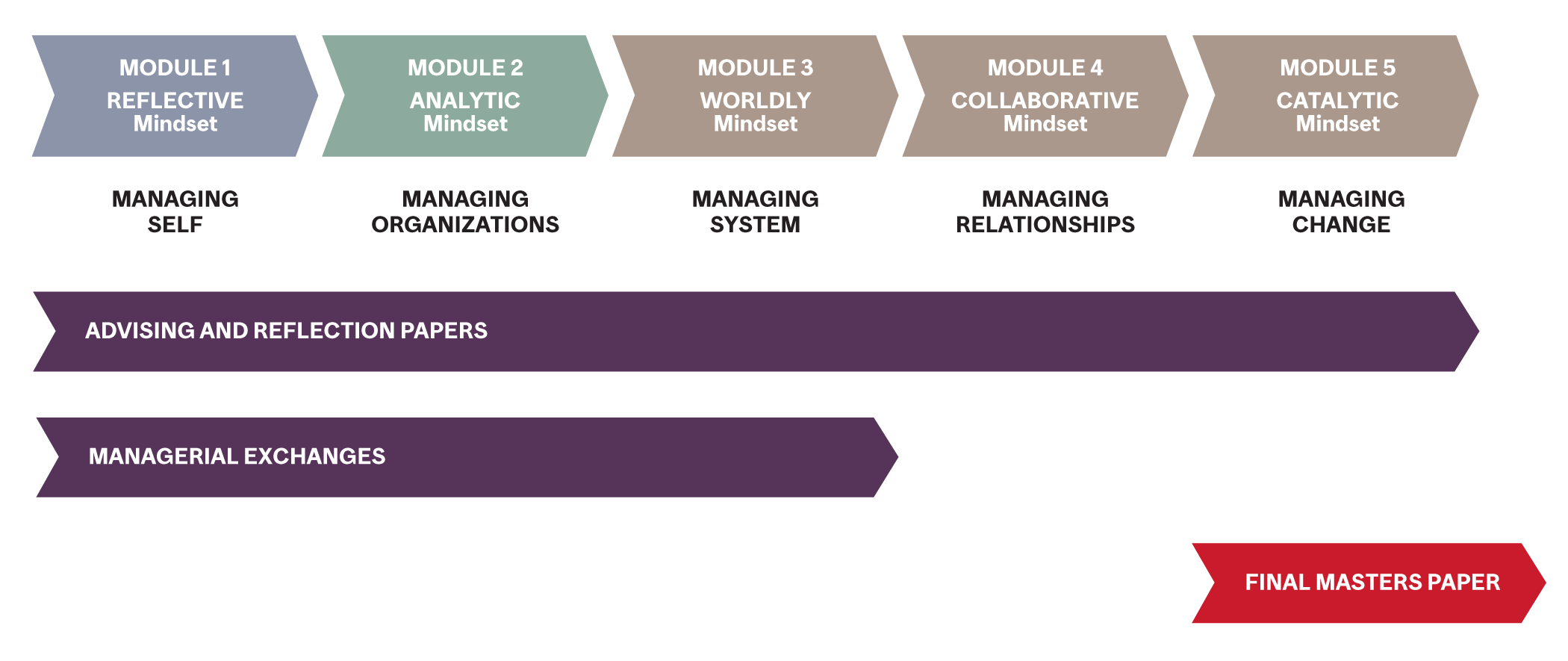
Module 3 -The Worldly Mindset: Navigating the System
The delivery of health care is rooted within highly complex systems that vary enormously across the world - from fully socialized to market-driven. Yet every system struggles with where it should sit on this continuum. Because most practitioners - whether managers or clinicians - typically spend their careers within a single system, they rarely have the opportunity to appreciate the alternatives. Our Worldly Mindset module focuses on these contextual "systems", exploring the various social institutions within the health care field and their interactions with economic, political and social forces. The goal is to increase understanding of the dynamics of "system change". Students are encouraged to seek creative solutions based on an integrated, rather than a fragmented understanding of health care. Students also explore in greater depth the interactions between economics and health, and the possibilities for leveraging change within complex systems. We analyze for improvement every health care system represented by the current cohort of students.

Module 4 - The Collaborative Mindset: Appreciating Work Relationships
In this module, students focus on managing relationships with patients, professionals, health advocates, administrators, the government, the media and many other groups. Skill development includes relationship-building, negotiating, stakeholder coordination, knowledge management and "process consulting". The work in this module relies on formal teamwork among students. The managing of professional relationships is emphasized, with students developing the advanced skills necessary to build and lead complex networks rather than simple organizations. The integration of knowledge from multiple disciplines and perspectives is also examined. We integrate with and use the NHS health system in the UK as the focal point of our work in the Collaborative Mindset module.
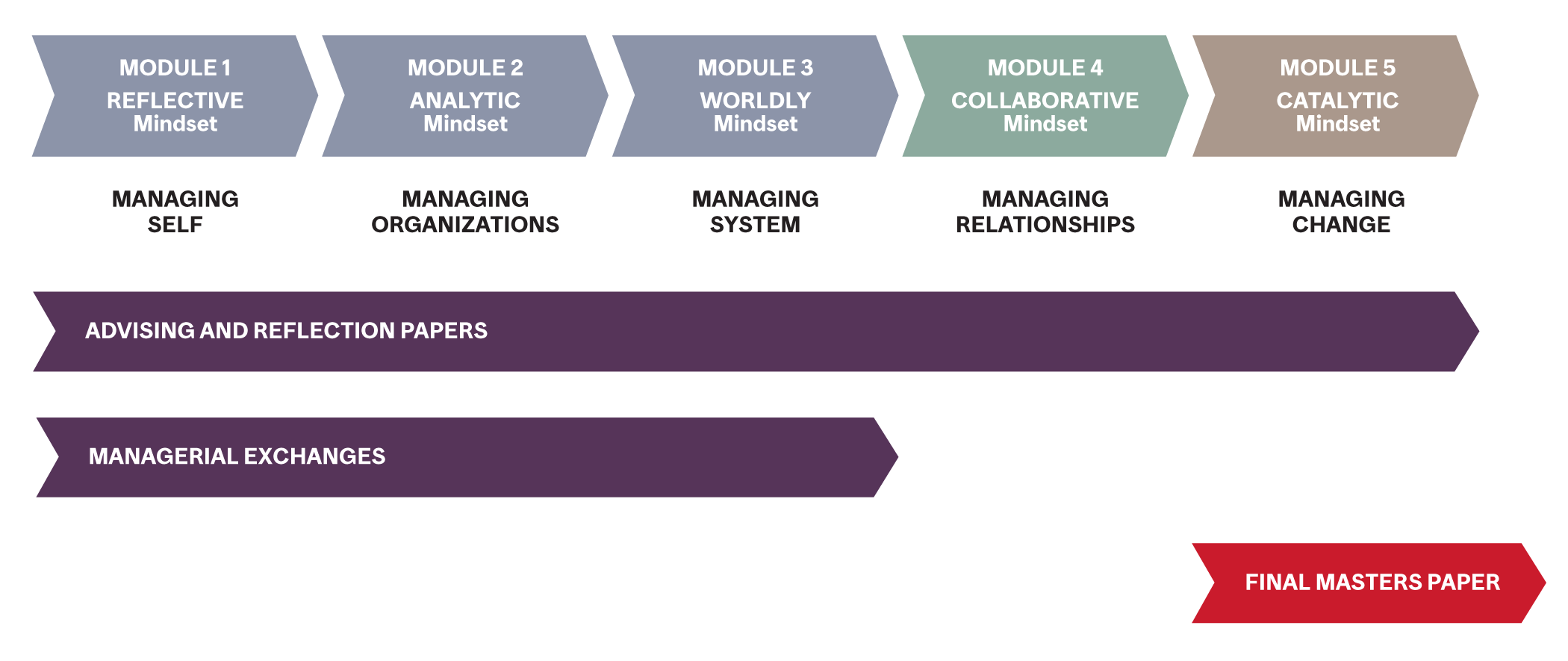
Module 5 - The Catalytic Mindset: Achieving Change
The final module is action-focused, integrative in nature, and geared toward the achievement of change. The projects on which students may have worked throughout the program are given considerable attention. Successful health management cases are reviewed and the action implications of adaptive management are explored. Other key areas of study include: integrated and sustainable approach to health; the notion of prevention and its applied dissemination; effective intervention within the policy environment; positive/negative outcomes of media exposure in health policy; and the notions of evaluation and accountability. Students integrate and synthesize the knowledge they have acquired during the preceding modules. The program closes with in-depth consideration of the process of transformation leadership and what it means to lead comprehensively, analytically, collaboratively, contextually, catalytically and reflectively. A concluding poster session leads the way forward to writing the final master's degree paper prior to graduation.
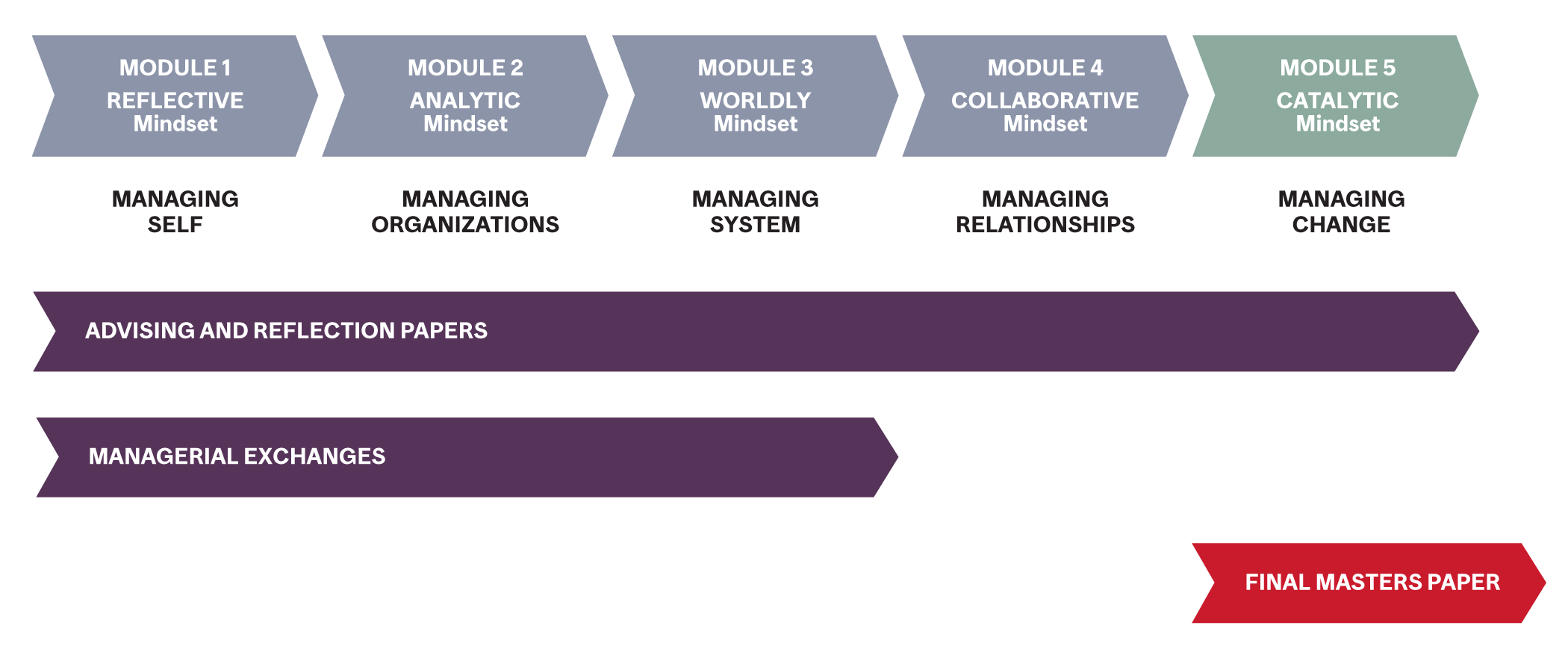
Managerial Exchange - An Experience in Consultation!
In addition to the five modules, the 3-credit Managerial Exchange is one of the program's novel elements to enhance the learning experience.
The Managerial Exchange examines how management is accomplished in health-related settings. It focuses on real-life, current exercises of power, authority and responsibility in your workplaces, and it identifies opportunities for improvement in personal and organizational leadership.
Projects
Some students come to the IMHL with a project or change in mind in their organization or system. This change can be a strategic project running in tandem with the five modules, or it can be a focus on change in an organization or context during the course of the program. A student may engage in an activity of their (or their sponsoring organization's) own choosing with the objective of affecting such significant change within their organization or community. It may be undertaken as either a solo project or, in the case of group participation from an organization or otherwise identifiable community, as a team effort. While not an initial requirement in the program, many students seek ways to create such organizational or system-wide influence during the program. Such an effort may be carried forward to the master’s degree final paper. Reports that derive from the master’s paper may ultimately be presented to a sponsoring organization, at appropriate health care conventions and/or in leading health care publications.
Reflection Papers
Students submit Reflection Papers following each of the first four modules relating the theories and learnings from the program to real aspects of their work environments. These provide an opportunity to explore job-related challenges in depth. Each student is part of a small advising team throughout the program. These advising groups also contribute valuable insight into the ongoing evolution of the program content and design.
Self-Study and Final Paper
Self-Study enables participants to learn the "language of management", focusing especially on financial management as an example, so that classroom sessions can begin at a higher level. The Final Paper is written under the supervision of a unique faculty advisor at the conclusion of the last module. Participants have 3-4 months in which to complete the final paper. It is required to complete the degree of Master of Management.
Sonia Chehil, Mental Health Advisor, Ministry of Health, Guyana
My core interest is, of course, in health. I was struggling between doing a Master’s program in public health, versus an MBA versus the IMHL. I actually thought that the IMHL married Public health and the MBA quite well. And I am glad to say I think it actually did. They took the core pieces that I was interested in and put them together. Had I just done a Master’s in public health I wouldn’t have been able to grow as a manager in the same way as I have through the IMHL. If I had just done an MBA I wouldn’t have grown much as a leader as I have through doing the IMHL. So I think that the IMHL has very nicely married the core that I wanted from public health as well as from an MBA.
The IMHL differs from traditional MBAs or MHAs in that it focuses on the connection between management and leadership, instead of the administrative functions of management. It is also mindset based instead of discipline based, meaning all disciplines are integrated within each mindset.
Program Pedagogy
Particular attention is paid to the pedagogy in the program. Participants are regularly in different small discussion groups for interactive learning, but almost never in the same small group in consecutive days. A "50/50" rule allows for half the class time to be turned over to students to grapple with application to practice, in real time, of the concepts, theories and frameworks provided in class. Unique group arrangements that pay particular attention to active listening characterize the class.
Every day begins with reflection — personal time for writing down thoughts and insights that have come up since the previous day, followed by discussion in small groups, and an open-ended plenary discussion.
“The IMHL engages people in a way that changes their lives. The class becomes a strong learning community, which helps participants to revitalize themselves, their organizations, their management practices, in and beyond their communities. No one who has visited our classroom wants to go anywhere else for a development program in health care.” - Professor Henry Mintzberg, IMHL Founder
Three stages of Reflections: solo, small group and big circle/plenary
|
|
|
|
Ted's Talk
Here is what Theodore (Ted) Marmor, Professor Emeritus at Yale University and former director of the Worldly Mindset module, wrote about the program:
"I have taught for about a decade in the Harvard Kennedy School program for senior fellows. I have taught at the executive program in health policy and management at Columbia's School of Public Health, and given lots of talks around the world.
So, where does that leave me? The IMHL is better structured to bring the participants to a realistic view of management and decision-making than any other program with which I have been associated. The program is cross-disciplinary, cross-border, and cross-experience, with an emphasis on comparative perspectives from people with different starting points. The five mindsets are sensibly distinguished and attended to rather than privileging one or another approach, whether psychological, marketing, political or whatever. I have come back again and again because I believe this is serious education, not trying to milk the cash cow of executive education."

The IMHL has an alliance with the Canadian College of Health Leaders.
McGill University is located on land which has long served as a site of meeting and exchange amongst Indigenous peoples, including the Haudenosaunee and Anishinabeg nations. McGill honours, recognizes and respects these nations as the traditional stewards of the lands and waters on which we meet today.



